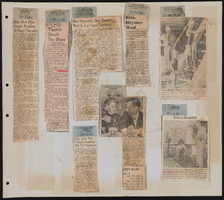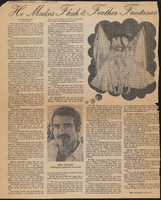Search the Special Collections and Archives Portal
Search Results
North Las Vegas Chamber of Commerce Records
Identifier
Abstract
The North Las Vegas Chamber of Commerce Records documents the activities of the North Las Vegas Chamber of Commerce in southern Nevada from approximately 1970 to 2007. The majority of this collection is comprised of photographs and scrapbooks documenting North Las Vegas Chamber of Commerce member events. The collection also includes business guides, event invitations, and issues of the organization’s monthly newsletters,
Archival Collection
River Mountains Trail Partnership Records
Identifier
Abstract
The River Mountains Trail Partnership Records date from 1995 to 2015 and document the planning and construction of the River Mountains Loop Trail in Clark County, Nevada. The collection contains meeting agendas and minutes, correspondence, project notes, trail maps, land surveys, grant applications, photographic slides of the trail and Lake Mead, environmental assessments, ephemera from National Trails Day, trail guides, interpretive plans, and development reports.
Archival Collection
Joe Williams Music Scores
Identifier
Abstract
The Joe Williams Music Scores date from 1940 to 1991 and comprise the handwritten musical scores of American jazz musician Joe Williams, born Joseph Goreed. Many of the musical scores are Williams' original arrangements.
Archival Collection
Jon E. Cobain Papers
Identifier
Abstract
The Jon E. Cobain Papers (1963-2009) contains material representing Cobain's experience as the first official graduate of Nevada Southern University (later University of Nevada, Las Vegas) in 1964. Materials include photographs of Cobain and his family, a scrapbook from his 1964 graduation day, newsletters, a copy of Beau's Bits Handbook, personal correspondence, and his diploma. This collection is comprised exclusively of digital surrogates.
Archival Collection

Interview with Joyce Anne (Reese) Parkhurst, November 27, 2004
Date
Archival Collection
Description
Text

Roadrunners Internationale A-12 session, October 5, 2005
Date
Archival Collection
Description
Text

Amber Diskin oral history interview: transcript
Date
Archival Collection
Description
Oral history interview with Amber Diskin conducted by Barbara Tabach on January 5, 2018 for the Remembering 1 October Oral History Project. In this interview, Amber Diskin discusses her experience at the Route 91 Harvest music festival during the October 1, 2017 mass shooting in Las Vegas, Nevada. Diskin talks about finding her way home after escaping the crowds and letting her family and friends know she was not hurt. She speaks of the aftermath of the shooting, including how her children were affected, the post-traumatic stress disorder she developed, and how the shooting has affected her love of concerts. As a native Nevadan, she shares her views of Las Vegas and how her sense of community deepened after this event. Diskin ends the interview by discussing her appreciation for the first responders and the gift baskets she helped distribute to hospitals, police stations, and the fire department.
Text

Transcript of interview with Gilbert D. Yarchever by Claytee White, 2006
Date
Archival Collection
Description
Gilbert Yarchever was one of nine siblings, born and bred in Pittsburgh, Pennsylvania. He describes the way his mother?s family was granted the last name of ?Kurfeersf" by Emperor Franz Joseph (of Austria-Hungary), explains the Seder (the Jewish observation of the exodus of Hebrews from Egypt), and tells what it was like to survive the Depression. Gilbert describes the jobs he held after high school and the government examination he took that led to his lifetime of adventure and travel. He moved to Washington, D.C., in 1940 and kept himself busy working for the government and taking classes at George Washington University, as well as working part time at Hecht Department Store and as a freelance court reporter. Following the attack on Pearl Harbor in 1941, Gilbert was sent to Africa on a merchant ship, helped smuggle Jewish survivors into Jerusalem, and was assigned the task of negotiating with Arab sheikhs for laborers to build a road. In the years after that, he worked in Europe, Panama, Alaska, Japan, and Hawaii and describes many of the jobs he was responsible for and many of the individuals he met. He also married and had children, kept up with university classes whenever he could, and collected art objects and paintings. Following his retirement in 1977, Gilbert and his family came to Las Vegas and bought a condo in Regency Towers. He did some consulting work for a couple of years, and then he and his wife began traveling around the states and going abroad. He was involved with UNLV?s EXCEL program, the music department, and the Las Vegas Art Museum. (He and his second wife Edythe presented the first major exhibition on Holocaust art at the museum.) These days Gilbert often donates pieces from his art collection to churches, synagogues, and charitable organizations.
Gilbert Yarchever was in the Navy during World War II, helped smuggle Jewish refugees into Jerusalem, worked as a civil servant in many countries, and moved to Las Vegas in 1977. He helped found the EXCEL program at University of Nevada, Las Vegas and was an art collector with his wife, Edythe Katz-Yarchever.
Text


